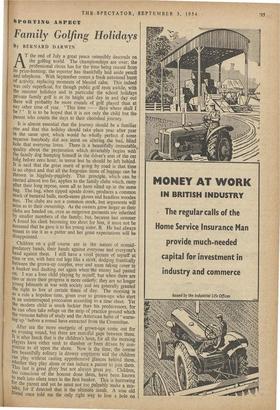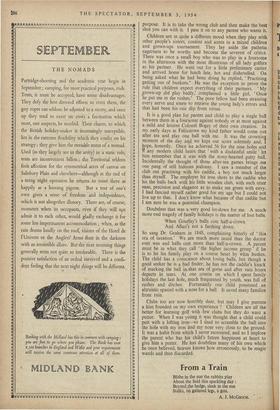ISpORTING ASPECT
Family Golfing Holidays
By BERNARD DARWIN T the end of July a great peace ostensibly descends on the golfing world. The championships are over; the professional circus has for the time being ceased from its prize-hunting; the reporter has thankfully laid aside pencil and telephone. With September comes a fresh autumnal burs; of activity, replacing moments of blessed calm. This indeed was only superficial, for though public golf rests awhile, with the summer holidays and in particular the school holidays private family golf is at its height and day in and day out there will probably be more rounds of golf played than at any other time of year. This time — days where shall I be ? ' It is to be hoped that it is not only the child but the parent who counts the days to their cherished journey.
It is almost essential that the journey should be a familiar one and that this holiday should take place year after year in the same spot, which would be wholly perfect if some superior busybody did not insist on altering the bad, blind hole that everyone loves. There is a beautifully immutable quality about the preparation which invariably begins with the family dog humping himself in the driver's seat of the car lohg before zero hour, in terror lest he should be left behind. It is said that the great merit of going by road is that time 13 no object and that all the forgotten items of luggage can be thrown in higgledy-piggledy. This principle, which can be carried almost too far, applies to the family clubs which, rusty after their long repose, seem all to have silted up in the same bag. The bag, when tipped upside down, produces a common stock of battered balls, moth-eaten gloves and headless wooden tees. The clubs are not a common stock, but arguments will arise as to their ownership. As the owners grow larger so their clubs are handed on, even as outgrown garments are inherited by smaller members of the family; but, because last summer A found his cleek becoming too short for him, it must not be assumed that he gave it to his young sister, B. He had always meant to use it as a putter and her great expectations will be disappointed.
Children on a golf course are in the nature of nomad- predatory bands, their hands against everyone and everyone's hand against them. I still have a vivid picture of myself at nine or ten, with bare red legs like a stork, dodging frantically between the grown-up couples, ever and anon taking cover in a bunker and dashing out again when the enemy had passed nn. I was a lone child playing by myself, but when there aro two or more their progress is more orderly; they are no longer Young Ishmaels at war with society and are generally granted the right to live at certain times of day. The morning is as a rule a hopeless time, given over to grown-ups who start in an uninterrupted procession according to a time sheet. Yet the modern child is much luckier than his predecessors, for he can often take refuge on the strip of practice ground which the virtuous habits of study and the American habit of warm- mg up' before a round have extracted from the Committee.
After tea the more energetic of grown-ups come out for an evening round, but there are merciful gaps between them. It is after lunch that is the children's hour, for all the morning Players have either sunk to slumber or been driven by con- science to sit upon the shore. Now is the time; the course lies beautifully solitary in drowsy emptiness and the children can play without casting apprehensive glances behind them, Whether they play alone or can induce a parent to join them. This last is great glory but not always great joy. Children, too conscious of the honour done them, have been known to melt into silent tears in the first bunker. This is harrowing for the parent and yet he must not too palpably make a mis- take, for if detected that is the ultimate insult. A wise old friend once told me the only right way to lose a hole on
purpose. It is to take the wrong club and then make the best shot you can with it. I pass it on to any parent who wants it.
Children are in quite a different mood when they play with other people's sisters, cousins and aunts in a mixed children and grown-ups tournament. They lay aside the pathetie eagerness to be worthy and become the severest of critics. There was once a small boy who was to play in a foursome in the afternoon with the most illustrious of all lady golfers as his partner. He went out for a little preliminary canter and arrived home for lunch late, hot and dishevelled. On being asked what he had been doing he replied, ' Practising getting out of bunkers.' He was the exception to prove the rule that children expect everything of their partners. ' My .grown-up did play badly,' complained a little girl, ' Once he put me in the rushes.' The poor fellow had been straining every nerve and sinew to retrieve the young lady's errors and that had been his one slip from virtue.
It is a good plan for parent and child to play a single ball between them in a foursome against nobody or at most against a mild and lenient Colonel Bogey of their own creation. In my early days at Felixstowe my kind father would come out after tea and play one ball with me. It was the crowning moment of the day and we kept our score solemnly and. I hope, honestly. Once we achieved 56 for the nine holes and If any modern child hears that ' with a disdainful smile ' let him remember that it was with the stony-hearted gutty ball. Incidentally the thought of those after-tea games brings me one pang of still hideous jealousy. I saw a member of the club out practising with his caddie, a boy not much larger than myself. The employer hit iron shots to the caddie who hit the balls back with his little wooden club, with such utter ease, precision and elegance as to make me green with envy. I had fancied myself rather good for my age but I could not live up to that. I don't know what became of that caddie but I am sure he was a potential champion.
Doubtless that was a very good let-down for me. A much more real tragedy of family holidays is the matter of lost balls.
When Gourlay's balls cost half-a-crown And Allan's not a farthing down.
So sang Dr. Graham in 1848, complaining bitterly of this era of taxation.' We are much more taxed than the doctor ever was and balls cost more than half-a-crown. A parent must be in what they call ' the higher income group' if he is to let his family play on a course beset by whin bushes. The child has a conscience about losing balls, but though a good seeker he is a bad finder; he has not the caddie's knack of marking the ball in that sea of gorse and after vain hours departs in tears. At one course on which I spent family holidays the last hole, much frequented by youth, was full of rushes and ditches. Fortunately one child possessed an altruistic spaniel with a nose for a ball. It saved many families from ruin.
Clubs too are now horribly dear, but may I give parents
a hint founded on my own experience Children are all the better for learning golf with few clubs but they do want a putter. When I was young it was thought that a child could putt with a lofting iron—so I Used to scramble the ball into the hole with my iron and my nose very close to the ground. It was a habit from which I never recovered, and so I implore the parent who has his child's future happiness at heart to give him a putter. He has doubtless many of his own which he once believed, heaven knows how erroneously, to be magic wands and then discarded.



































 Previous page
Previous page